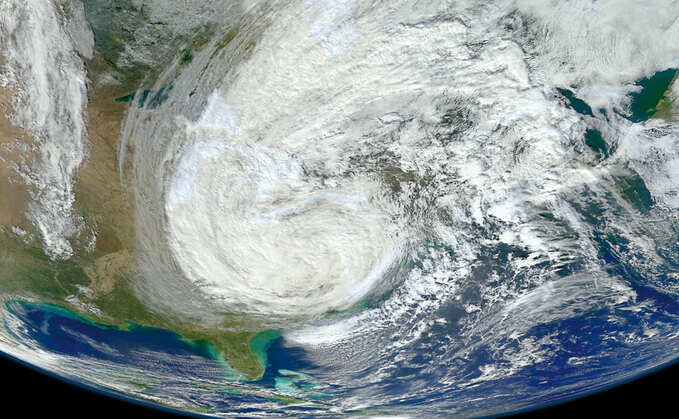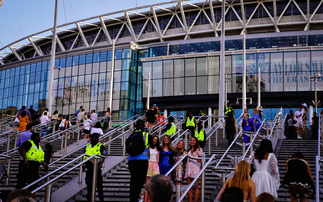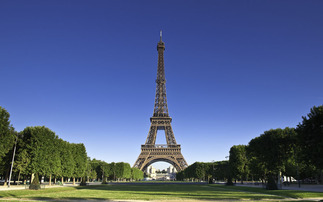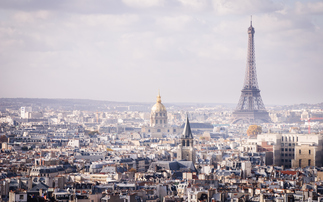
The IPCC report is genuinely terrifying and Russia's attack on Ukraine has revealed the complacency contained in suggestions worst case climate scenarios can be definitively ruled out - the only good news is that the world knows what needs to be done and has the tools to do it
This post contains spoilers about the film Don't Look Up, although, let's be honest if you're reading this blog there's a good chance you've seen it already.
"We really did have everything, didn't we? I mean, when you think about it."
Dr Randall Mindy, Don't Look Up
A couple of weeks ago I finally got round to watching Don't Look Up, a full two months after it divided critics and audiences and sparked one of the very phenomena it satirised: an angry and impassioned online discourse.
Watching the film a few weeks removed from the initial reaction, some of the critiques of what is, in my view, a hugely enjoyable and thought-provoking movie looked even more misguided and overblown. Some of the criticism was interesting and arguably justified - it is true the film had little to say about the world outside America and by extension matters of climate justice; for me, the decision to abort the attempt to save the world felt implausibly nihilistic. But the accusations that the film was somehow not subtle enough, that it was smug in its condemnation of a political-media-industrial complex that revels in its own fatuity and inaction, that a planet-killing comet is an imperfect metaphor for the incremental impacts of the climate crisis felt like they wildly missed the point, and in so doing further justified the film's satirical efforts.
The lack of subtlety was clearly intended and entirely appropriate as a means of tackling an era that obliterates subtlety. As for smugness, it is always in the eye of the beholder. Try explaining to someone why you think they are dangerously wrong in a way that does not risk accusations of smugness; it doesn't make them any less dangerously wrong. And, as the film's director Adam McKay explained in a recent podcast with Volts David Roberts, no metaphor is ever going to be exactly right, especially for something as complicated as climate change, but a comet that the world chooses to ignore is not the worst parallel for our current predicament.
As McKay put it: "No allegory is a perfect fit. So yeah, there's a little cheat that we did: we took away the hyper-object of global warming, which is so vast and timeless and slow-moving, and we put in a very concrete event, a comet. So no, it's not a precise match at all. The real story of the movie is that the hyper-object, the hard-to-categorise force, is our reaction to the comet. I would say that's the important story when it comes to the climate crisis. It's about our reaction to the climate crisis, which is pretty horrific to this point, and kind of a disaster."
He's right, of course, but equally the climate crisis is not totally unlike a comet. Reading the latest IPCC report this weekend I was struck that climate change may or may not be a 'planet killer' (and we'll come back to that particular debate), but wave after wave of smaller comets, doing immense and irrevocable damage to our ecosystems, our economies, and our very existence? That's almost exactly what we're facing, just without the explosions.
'Sobering', 'terrifying', 'catastrophic', 'disastrous', I am so tired of scouring the end times thesaurus searching for words to describe IPCC reports. But such terms are simply an accurate description of what scientists themselves are saying, albeit via the carefully guarded language of academic rigour and diplomatic review processes.
As the report makes clear, between 3.3 billion and 3.6 billion people live in areas that are "highly vulnerable" to climate change, key ecosystems are losing their ability to store carbon, many low lying areas are facing a future of inundation, and millions of people face drastically increased risk of deadly heatwaves, floods, and droughts.
What does this litany mean in practice? Well, consider this from the IPCC's FAQ document accompanying today's report: "the geographic patterns and the regional and local abundance of plants and animals are changing, with potentially severe impacts for herders, farmers, fishers, hunters, foragers and other people who directly rely on nature's services… Although there have been some positive impacts on agricultural productivity in some high-latitude regions, with ongoing warming, current global crop and livestock areas will become increasingly unsuitable. Even in a world with low greenhouse gas emissions (warming below 1.6C by 2100), eight per cent of today's farmland will become climatically unsuitable by 2100."
Or there's this: "The more often ecosystems are impacted by extreme events and the more intense the event, the further they are pushed towards so-called tipping points. Beyond those points, abrupt and in some cases irreversible changes can occur - such as species going extinct. This risk increases steeply with rises in global temperature. Current projections imply that at a global warming level of 2C by 2100, up to 18 per cent of all species on land will be at high risk of going extinct. If the world warms up to 4C, every second plant or animal species that we know of will be threatened."
Or this: "Children aged 10 or younger in the year 2020 are projected to experience a nearly four-fold increase in extreme events under 1.5C of global warming by 2100, and a five-fold increase under 3C warming… Globally, the percentage of the population exposed to deadly heat stress is projected to increase from today's 30 per cent to 48-76 per cent by the end of the century, depending on future warming levels and location. If the world warms more than 4C by 2100, the number of days with climatically stressful conditions for outdoor workers will increase by up to 250 workdays per year by century's end in some parts of South Asia, tropical sub-Saharan Africa and parts of Central and South America. This would cause negative consequences such as reduced food production and higher food prices." That's the future our children have to contemplate.
And it gets worse. Because these various discrete threats struggle to capture the interconnected way these impacts can cascade through the economic and geopolitical systems that strive to keep us safe. As the IPCC observes, "it is an established fact that [climate impacts] are interacting with multiple other societal and environmental challenges. These include a growing world population, unsustainable consumption, a rapidly increasing number of people living in cities, significant inequality, continuing poverty, land degradation, biodiversity loss due to land-use change, ocean pollution, overfishing and habitat destruction as well as a global pandemic. Where trends intersect they can reinforce each other, intensifying risks and impacts, which affect the poor and most vulnerable people the hardest".
The biggest fear here, as always, is in the second order impacts that could flow from heatwaves and droughts and floods and food shortages. The migration and conflicts and stand-offs, potentially between nuclear powers, that would almost inevitably follow. Climate impacts are set to impose immense stresses and volatility on fragile states and governments, many of which are already wrestling with historic injustices (both real and imagined) and are tasked with navigating a transition away from the most polluting and most powerful industries the world has ever known. Russia will not be the only state in the coming years to respond to shifting geopolitical tensions with a toxic brew of nativism and dangerous aggression. Climate change may not be an existential threat in and of itself, but it makes existential threats considerably more likely.
Not for nothing has UN Secretary General Antonio Guterres described today's IPCC report as unlike anything he has ever seen before, "an atlas of human suffering and a damning indictment of failed climate leadership". That's from a guy who is currently also receiving reports about the very real risk of nuclear war.
How should governments and businesses respond to the escalating climate crisis at a time when we are facing even more imminent threats thanks to Russia's invasion of Ukraine and the humanitarian tragedy and geopolitical instability it has unleashed?
The first point is to recognise that any sense of creeping complacency has been obliterated by Vladimir Putin's unprovoked attack. There has been an optimistic and compelling school of thought in recent years that the worst-case warming scenarios can increasingly be ruled out. The argument went something like this: clean technologies are more cost competitive than ever; over 90 per cent of the world is covered by net zero emission targets; the world is on track for 2.7C of warming if the national climate action plans and targets are enacted in full; warming projections could be pulled below 2C in the next few years if long term net zero targets are translated into commensurate near-term action.
This argument has a lot to recommend it. The clean tech revolution has been the most exciting development of the past decade. It is entirely possible the worst case warming scenarios can be averted.
And yet, with a complacency redolent of Boris Johnson recently defending military cuts by dismissing the very idea of tank battles on European soil, this encouraging outlook will not have factored in the possibility of a new Cold War. We were told coal was gradually being consigned to history, but it is now experiencing a revival as gas prices soar. Gas is meant to be a bridge fuel, and yet all around the world calls are understandably growing for governments to respond to Russian aggression by ramping up investment in domestic gas infrastructure. The logical response to the current crisis may be a global energy efficiency and clean power development drive to rapidly curtail our reliance on the fossil fuels that are at the root of Putin's power, but logic often jostles with truth to become the first casualty of war.
One does not have to be a geopolitical genius to recognise there are only three possible end games to the current conflict: Ukraine resists, Putin overreaches, and the Russian public and/or military deliver change at the Kremlin; a new Cold War era defined by brutal proxy conflicts and the constant risk of mutually assured destruction; full blown escalation of the type history has seen many times before. To increase the chances of either an end to Putinism or at least a dominant and defensible position in the new Cold War, the West can and must support Ukraine at every turn, including through the economic sanctions that can only be enabled and sustained through an accelerated energy security programme centred on renewables and efficiency. But such tactics will in turn fuel Putin's paranoia and increase the chances of the worst-case scenarios that could flow from it. The risk of catastrophic miscalculation is real.
Either way, climate diplomacy efforts are left hanging by a thread at a time when global emissions are still rising. If the next decade was always going to be the one where we would either kill or revive hopes of delivering on the temperature goals of the Paris Agreement, the challenge just got an order of magnitude harder still. Medium to worst case climate scenarios remain terrifyingly plausible.
Consequently, the underpowered climate resilience and adaptation strategies of governments and businesses alike urgently need revisiting. The IPCC report highlights how climate resilience measures tend to pay for themselves, and yet they are still too easily ignored and sidelined by policymakers, investors, business leaders, and planners.
Alongside, the global clean tech and energy efficiency drive that so urgently needs to accelerate, there has to be a renewed focus on enhancing climate resilience, especially in the most vulnerable countries and through the restoration of natural ecosystems. To continue to build on flood plains, tear up peat bogs, construct buildings that exacerbate heat stress, and reject calls to tackle climate-related 'loss and damage' is so stupid it borders on the criminal. Every business and investor now lobbying for bolder net zero policies should also be calling for enhanced climate resilience.
Because it is here that the slither of good news is to be found amidst this almost unbearably bleak news cycle. There is a growing realisation that the world knows what needs to be done, and the solutions that can resolve so many of the crises we are now facing are broadly aligned. Clean technologies and nature restoration are both the only way to stop climate and geopolitical risks intensifying further still, and the best path for neutering the power of aggressive petrostates and building a 21st century economy on inherently more stable foundations. Climate security is energy security is national security. You'd hesitate to call it 'eco-liberalism' given there are multiple routes via which decarbonisation can be delivered, but the ideals sketched out in the Glasgow Climate Pact point to a world that is healthier, wealthier, and safer for all.
Climate change is not unlike a comet, and that comet is closer than ever before. But there is still time to look up.
Want to find out more about how the net zero transition will impact your business? You can now sign up to attend the virtual Net Zero Finance Summit, which will take place live and interactive on Tuesday 29 March and will be available on demand for delegates after the event.










